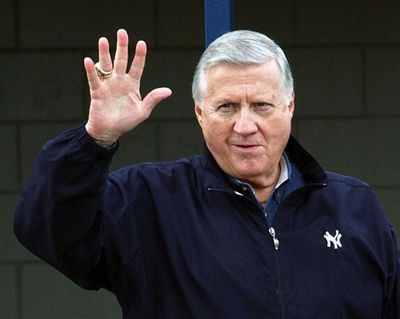Baseball’s volatile visionary
Yankees owner, dead at 80, built team into an empire

NEW YORK – He was baseball’s bombastic Boss.
He rebuilt the New York Yankees dynasty, ushering in the era of multimillion-dollar salaries and accepting nothing less in return than World Series championships.
He fired managers. Rehired them. And fired them again.
He butted heads with commissioners and fellow owners, insulted his players and dominated tabloid headlines – even upstaging the All-Star game on the day of his death.
George Michael Steinbrenner III, who both inspired and terrorized the Yankees in more than three decades as owner, died Tuesday of a heart attack at age 80.
“He was and always will be as much of a New York Yankee as Babe Ruth, Lou Gehrig, Joe DiMaggio, Mickey Mantle, Yogi Berra, Whitey Ford and all of the other Yankee legends,” baseball commissioner Bud Selig said.
Once reviled by fans for his overbearing and tempestuous nature, Steinbrenner mellowed in his final decade and became beloved by employees and rivals alike for his success.
Steinbrenner was taken from his home to St. Joseph’s Hospital in Tampa, Fla., and died about 6:30 a.m., a person close to the owner told the Associated Press.
“George was a fierce competitor who was the perfect fit for the city that never sleeps – colorful, dynamic and always reaching for the stars,” former President Bill Clinton said.
Yankees captain Derek Jeter added: “He expected perfection.”
In 37 1/2 years as owner, Steinbrenner whipped a moribund $10 million team into a $1.6 billion colossus that became the model of a modern franchise, one with its own TV network and ballpark food business.
Under his often brutal but always colorful reign, the Yankees won seven World Series championships, 11 American League pennants and 16 AL East titles, going on spectacular spending sprees that caused Larry Lucchino, president of the rival Boston Red Sox, to dub Steinbrenner’s Yankees the “Evil Empire.”
He moved the Yankees from their tradition-rich “House that Ruth Built” into a new $1.5 billion Yankee Stadium. Call it the “House the Boss Built.” He appeared there just four times: the April 2009 opener, the first two games of last year’s World Series and this year’s home opener, when Jeter and manager Joe Girardi went to his suite and personally delivered his seventh World Series ring.
“He was very emotional,” son Hal Steinbrenner said then.
Steinbrenner’s larger-than-life outbursts transcended sports and made him a pop culture figure whose firings were parodied on the TV comedy “Seinfeld” and even by Steinbrenner himself in commercials.
“George was The Boss, make no mistake,” said Berra, the Hall of Famer who ended a 14-year feud with Steinbrenner in 1999. “He built the Yankees into champions, and that’s something nobody can ever deny. He was a very generous, caring, passionate man. George and I had our differences, but who didn’t?”
New York was 11 years removed from its last championship when Steinbrenner, then an obscure son of an Ohio shipbuilder, headed a group that bought the team from CBS Inc. on Jan. 3, 1973, for about $8.7 million net.
Forbes now values the Yankees at $1.6 billion, trailing only Manchester United ($1.8 billion) and the Dallas Cowboys ($1.65 billion).
Former commissioner Fay Vincent, who fought many battles with Steinbrenner, said his legacy would be turning the Yankees “into an absolute gold mine and a monster of power and success in baseball.”
“He was one of the few who realized this was an iconic franchise and he could turn it into something really special, and he did,” Vincent said.
Steinbrenner ruled with obsessive dedication to detail – from trades to the airblowers that kept his ballparks spotless. When he thought the club’s parking lot was too crowded, Steinbrenner stood on the pavement – albeit behind a van, out of sight – and had a guard check every driver’s credential.
But he also tried to make up for his temper with good deeds and often-unpublicized charitable donations.
His rule was interrupted by two lengthy suspensions, including a 15-month ban in 1974 after pleading guilty to conspiring to make illegal contributions to the re-election campaign of President Richard Nixon. Steinbrenner was fined $15,000 and later pardoned by President Ronald Reagan.
He also was banned for 2 1/2 years for paying self-described gambler Howie Spira to obtain negative information on outfielder Dave Winfield, with whom Steinbrenner was feuding.
He changed managers 21 times and got rid of about a dozen general managers. When a Yankees public relations man went home to Ohio for the Christmas holiday, then returned in a hurry for a news conference to announce David Cone’s re-signing, Steinbrenner fired him.
“There is nothing quite so limited as being a limited partner of George Steinbrenner’s,” said John McMullen, one of his associates.
Steinbrenner hired Billy Martin in 1975, 1979, 1983, 1985 and 1987, firing him four times and letting him resign once as the two battled over substance and personality.
Martin disparaged outfielder Reggie Jackson and Steinbrenner by saying: “The two of them deserve each other – one’s a born liar, the other’s convicted.”
After Steinbrenner dismissed Berra as manager 16 games into the 1985 season, the 10-time World Series champion vowed he wouldn’t go to back to Yankee Stadium for a game until Steinbrenner apologized – which he did 14 years later.
Steinbrenner made no apologies for his bombast, even when it cost him.
“I haven’t always done a good job, and I haven’t always been successful,” Steinbrenner said in 2005. “But I know that I have tried.”